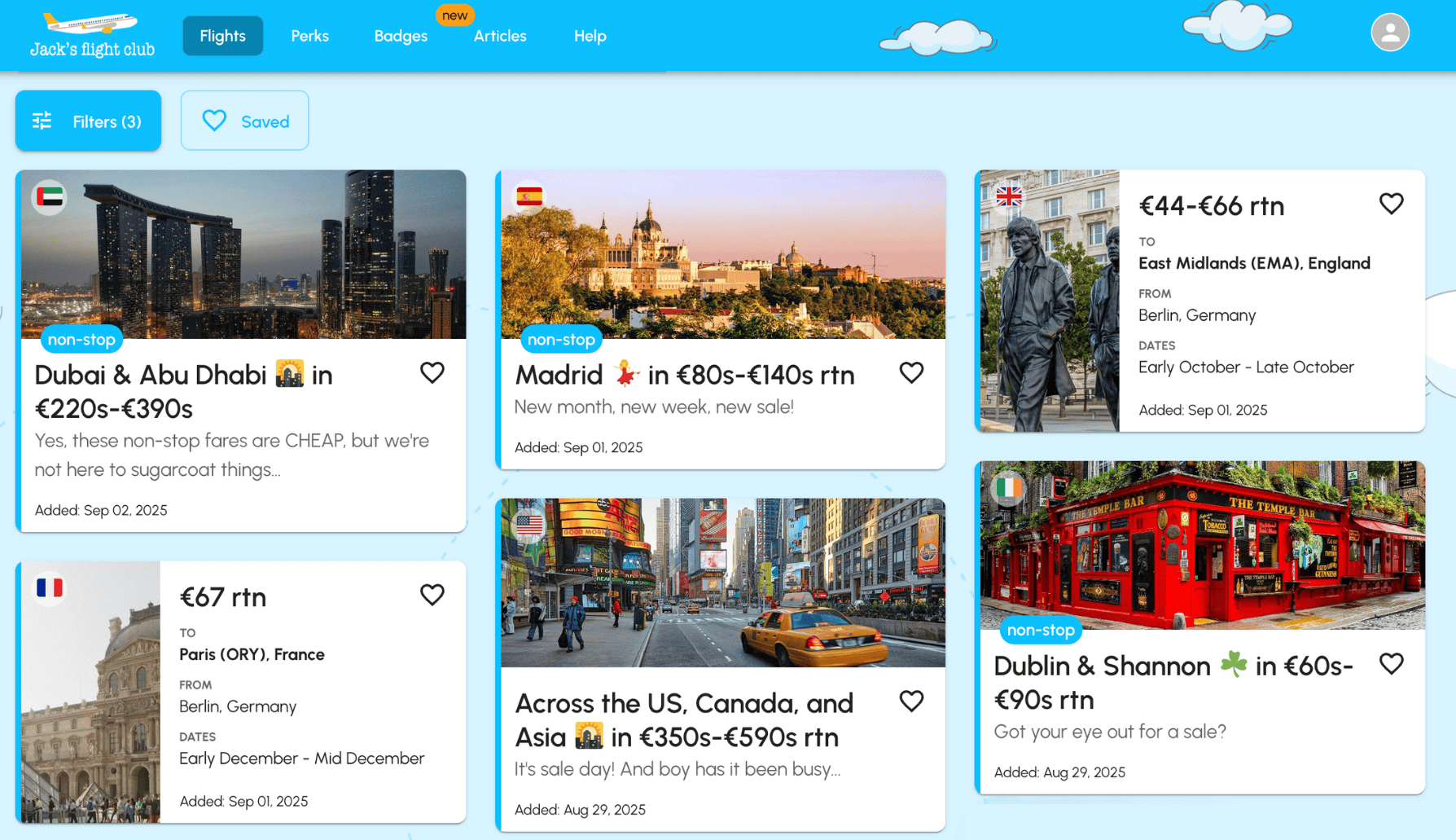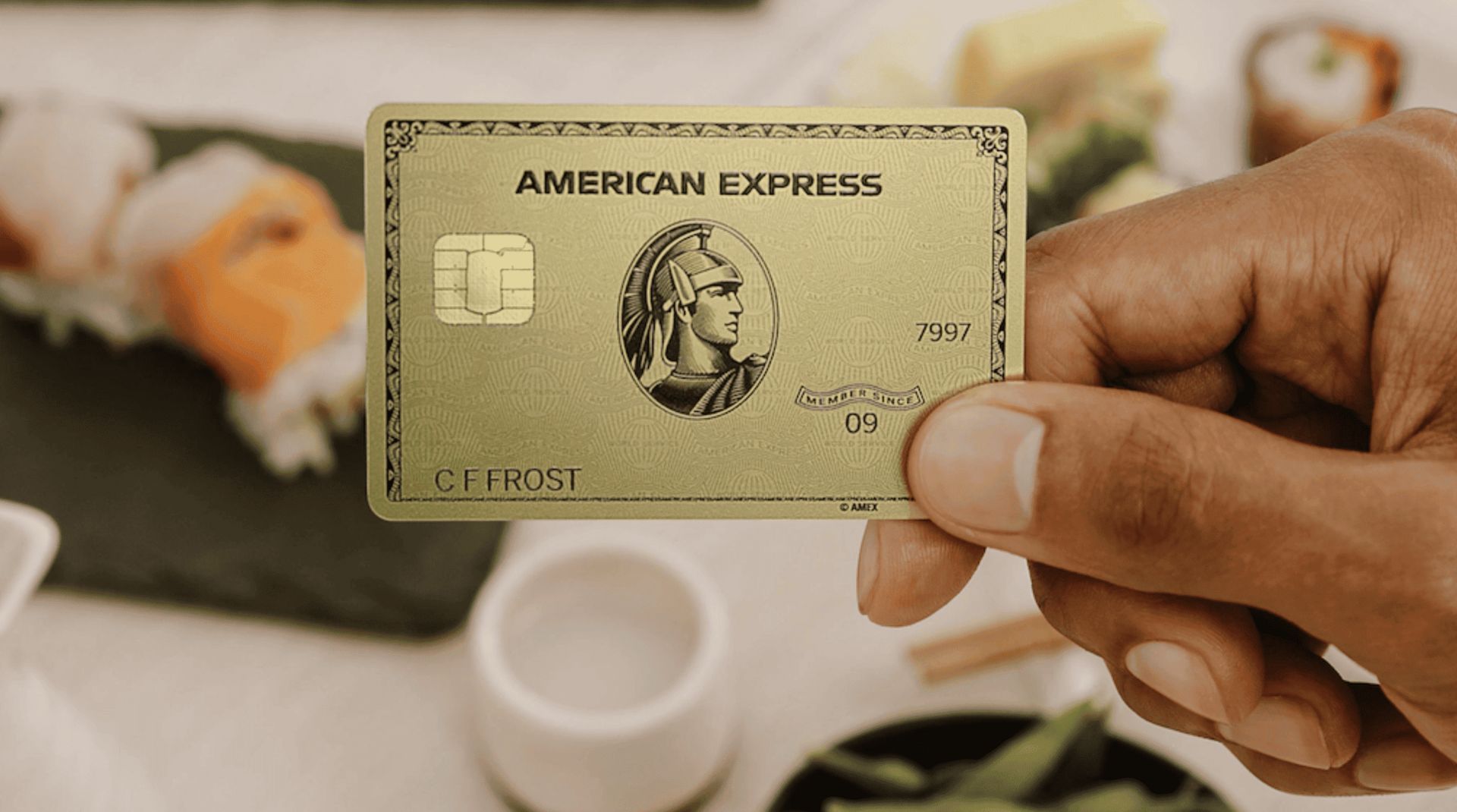Flights can be one of the biggest costs when you travel (often right after accommodation), but there are plenty of ways to keep your budget in check without adding extra hassle. I’ll share what’s worked for me over the years: how to find good flight deals without endless searching, tips for luggage and seat fees, and why savings you get with third-party sellers might not be worth it.
This article is part two of my four-part series on saving money while traveling. In part one, I shared strategies for finding affordable accommodation – from loyalty programs and mobile-only rates to house swaps and cashback extensions. Part three (out later this month) will cover other transportation options, such as trains, buses and car sharing, while part four will tackle travel money, insurance, and mobile data while traveling – the small details that don’t feel exciting, but can make a noticeable difference to your travel budget.
Note: this article contains affiliate links, which are marked with *.
In This Guide
How to Actually Find Cheaper Flights
You’ve probably heard the classic flight “hacks”: book on a Tuesday, clear your cookies, six months before the trip is the magic time to buy your ticket, and so on. Honestly? Most of that doesn’t work. The only one with some truth is booking early — this might help if you’re the kind of person who can plan a trip six months in advance (I most definitely am not).
So what to do instead? I start most of my flight searches on Google Flights – it’s fast, flexible, and has a great calendar overview for picking cheaper dates. But it’s worth cross-checking with other search engines like Kayak, Skyscanner or Momondo. Because not every platform lists the same airlines, the results can be dramatically different. These platforms also have some helpful features like exploration tools (if your dates and/or destination are flexible) and setting price alerts for your desired routes so that you get notified when fares drop.
One important note: be careful when search results point you toward an online travel agency (OTA) like Kiwi, eDreams, Expedia, etc. The fare might look a little cheaper, but in case of cancellations or changes, you’ll be dealing with the OTA – not the airline. That usually means long wait times and very little help. The Internet is full of stories of people whose trips went awry and who had to go through months of refund battles — safe to say, it's an experience you don’t want. Unless the price difference is really convincing, I would avoid these and book direct with the airline.
One more tip if you’re flying long-haul: airlines often have multiple versions of their websites — country-specific as well as international ones, and prices can vary between them. Check for potential price differences, using a VPN if needed. I once found a €100 difference in fares between Condor’s German (.de) and international (.com) sites. It doesn’t often work, but when it does, it’s a nice surprise.
Flight Deals that Land in Your Inbox
My favorite tip for finding cheap flights has nothing to do with search engines: the best flight deals I’ve ever found were in newsletters that track them, like Jack’s Flight Club, Secret Flying, or Fly4free. You tell them your preferred departure airport (and optionally some destinations you’re interested in), and you get an email or a push notification every time there’s a deal that matches your criteria. Thanks to these, I’ve flown to Tokyo for €450 round trip and New York for under €300. If your dates are flexible, this is by far the best way to find a bargain. Most of these services have free and premium tiers (they reserve some of the deals for premium members only). I stick with the free plans most of the time, but Jack’s Flight Club often does promos for €1 or even €0 for a few months – if I see one, I jump on it.
How to Avoid Overpaying for Luggage
Airlines make a lot of their money on extras, and two of the biggest ones are luggage and seat selection. The first thing to keep in mind is that with most airlines, the cheapest moment to add luggage is right when you’re booking the ticket. If you think you’ll need a checked bag, decide upfront – adding it later usually costs more.
The last few years, low-cost airlines have gone further and started charging for what used to be a normal carry-on bag. On Ryanair and easyJet, for example, only the small under-seat bag is free. Good news: the EU might ban this practice soon. Bad news: airlines will just bake the cost into ticket prices and pass it back to us anyway.
Until then, here’s one workaround: when you go through Ryanair or easyJet’s booking flow, you might be pushed toward buying a seat-and-bag bundle for around €35/flight (price may vary depending on the route). But if you just book the basic fare and keep clicking through, you’ll later get the option to add a cabin bag without a seat reservation for about €25. Voilà – €20 saved on the round-trip flight.
Better Seats Without the Fee
After luggage, the next big add-on is seat selection fees. I almost never pay for seats because I don't feel like it's worth it for me – if you’re tall, you may feel very differently about this. If you don’t want to pay but still want a better seat, there are a couple of ways to improve your chances.
One is what’s become affectionately known in travel media as “check-in chicken”: wait until the very last moment to check in. Airlines hold back better seats for passengers willing to pay, and as the check-in deadline moves closer, they release them for free. I’ve ended up in extra-legroom seats on Ryanair this way. On the flip side, I’ve also had a heart-stopping moment when I didn’t see a notification I set for myself and nearly missed the check-in cutoff time. If you’re going to play this game, you have to be very organized.
On full-service airlines that don’t charge for airport check-in, there’s also the old-fashioned approach: just ask at the counter. Even if you’ve already checked in online, they can often reassign you if you ask nicely. I do this regularly whenever I’m checking a bag and have to go to the counter anyway – and I often get the seat I want (team window over here!).
Flight Delays: What You’re Owed (and How to Claim It)
If your journey starts in the EU, or you’re flying into it on a European airline, your rights are protected under EU Regulation 261/2004. In practice, this means you’re often entitled to compensation for long delays or cancellations, unless the delay was due to extraordinary circumstances – plus meals and hotel stays if you’re stranded overnight.
Some airlines make this process smooth and painless. When my transatlantic flight with KLM was cancelled last year and I was rebooked to fly 24 hours later, they covered my hotel, meals, and on top of that I received €600 in compensation within a couple of weeks. Needless to say, I didn’t mind at all.
Others don’t make it nearly that easy. You can email them quoting the regulation, but don’t expect quick replies. If the airline drags its feet, you can complain to national aviation authorities, or use services like Flightright* or AirHelp* that will handle the whole process for you and only charge you if they succeed – though beware that they’ll take a hefty commission in that case. If you happen to have legal insurance in Germany and your policy covers such claims, you can also pass it to a lawyer – they’ll happily chase the airline on your behalf, and the legal fee will be covered by insurance.
If you’re not sure what exactly you’re entitled to (the rules differ depending on route length and delay time), the EU has a clear overview here. They also point you to the different ways of filing a claim. Other countries, like the UK, US, Brazil and Turkey, have their own laws that regulate passenger rights, plus there is an international Montreal convention which sets global rules for compensation in cases like delays, cancellations, or baggage issues – though it’s less comprehensive than the EU law. You can read about these different regulations here.
Collecting Airline Miles in Germany: Is It Worth It?
Most airlines have loyalty programs, but unless you’re a frequent business traveler, you won’t earn many miles just by flying. Earning miles from tickets alone is slow, and you’ll also end up tied to a single airline alliance – which may or may not fit where you actually want to go.
The better way to collect airline miles is through a credit card. Contrary to popular opinion, cards with airline miles are worth it in Germany. They don’t hand out the insane bonuses you see in the US (the land of scarce financial product regulation), but the rewards are still strong enough to make it worth your while.
The best credit card for collecting airline miles in Germany is the Amex Gold card*. Right now and until November 10, you get a 50,000 Membership Rewards points welcome bonus (the highest I’ve seen all year!) if you spend €4,500 within the first six months. On top of that, you earn one point per euro spent. You can convert your points into miles from 12 airline programs (like Air France/KLM Flying Blue or British Airways Executive Club) and redeem them on flights.
So what are these points worth? In most cases, 1 point is worth 1–2 cents, depending on how you redeem it. That means the 50,000-point welcome bonus alone is worth at least €500 in flights – and with smart redemptions, you can stretch it to €1,000. This can easily get you an intercontinental flight or multiple flights within Europe.
I have this card and I really like it — it’s the only credit card I don’t mind paying for. It costs €20 per month, but the rewards and sign-up bonus more than cover the cost for me. If you’ve ever wanted to try collecting miles, the current 50,000-point offer is about as good as it gets. Read my full review of Amex Gold or sign up here*.
Want more practical ways to make travel easier and cheaper? Check out part one of this series for tips on saving on accommodation costs, including secret hotels, home swaps and making the most of booking platform loyalty programs.
Next up in this travel series: trains, buses, and car sharing — the other ways of getting around that don’t have to drain your budget. Subscribe here if you’d like to get it straight to your inbox, along with the best deals and money-saving strategies in Germany.
Ad/Anzeige disclosure: This article contains affiliate links, which are marked with *. If you make a purchase through them, I’ll earn a small commission at no extra cost to you. This helps support the newsletter and keeps my content free. I only recommend products and services I’ve personally tried or thoroughly researched. Thank you for your support!




